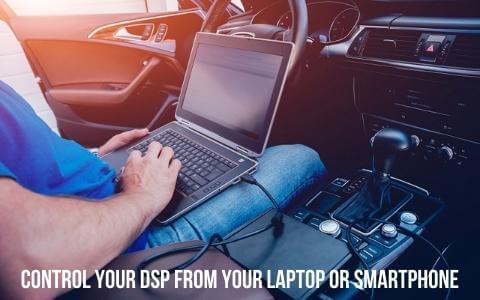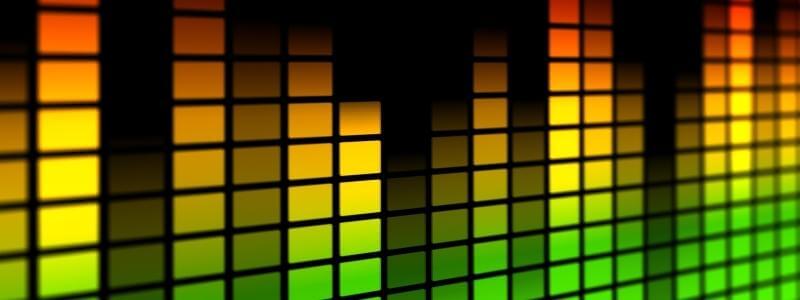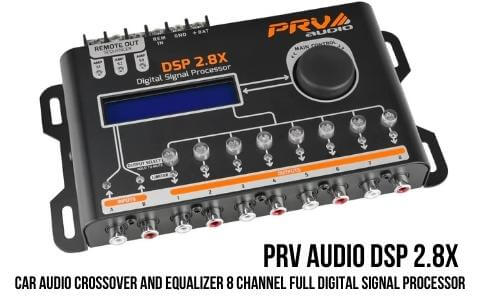What Is a Digital Signal Processor (DSP), And Do I Need One?
Any true audiophile that really cares about sculpting a pristine soundstage in their car really should get a Digital Signal Processor (DSP).
For most people, a good aftermarket car audio set up of component speakers, subwoofer and an amplifier is more than enough, but for those who want to pick out the different sounds and manipulate it to their liking, only a Digital Signal Processor does that.
Some head units have Time Alignment and a good quality EQ, which are two of the main features of any DSP, but a DSP will be much better. Not just with the Time Alignment and EQ, but other features, too.
A Digital Signal Processor will give you a lot more control over your music and will make a huge difference to any factory or aftermarket car stereo system. And it will also allow you to get the very best out of stereo music.
What Does A Digital Signal Processor Do?
Digital Signal Processor gives you more options for manipulating audio signals in your car stereo system. A DSP uses a microcontroller that manipulates the audio signals in the digital domain.
Pretty much all of the DSPs on the market include Equalizers (EQ), Time Alignment and Crossovers, and much more depending on the type of DSP you want.
When you combine the features of a DSP, you can dramatically improve the tonal balance and accuracy of your audio system, and improve the staging and imaging characteristics of your sound system.
Vocals and instruments will sound more like you’re at a live performance rather than a recording. What’s more, the listening experience overall will be much better, even for the average listener who might not even consider improvements are necessary.
How Do I Know if I Need a DSP?
For most people a DSP isn’t a necessary piece of equipment, but a true audiophile who likes to pick out and sculpt the slight nuances and make the soundstage in their car even crisper, then a DSP is a great tool.
If you don’t know if you need one, you probably don’t, because those who can discern the the nuance that need perfecting are the ones that look for sound processing equipment.
Listening to music in the car is a completely different experience than listening to some speakers at home. While out driving, or in any vehicle, the acoustics of the environment are different, and there are reflections and resonances that change the sound we hear from the speakers.
A DSP will allow you to modify this and really perfect the production of sounds and frequencies to suit any listener.
Related Reading
LOC vs DSP – Which to get for a Car Stereo System?
What To Look For In A Digital Signal Processor
When looking for a Digital Signal Processor, it’s important to know what to look for, and get one that manipulates the sound and frequencies to your liking.
Digital Sound Processors allow us to sculpt the soundstage how we want it, and you can either do everything manually, or get a DSP that’s pretty much fool-proof and easy to use.
You can get a DSP that can be controlled by the knobs on the device. This allows you to easily tweak the sound to your liking whenever you need to.
This is similar to other audio devices such as the amplifier, and once you get used to what each feature controls, it’s quite easy to sculpt the sound you like.
These need to be accessible, but also out of reach enough so the knobs aren’t regularly knocked.

As well as the onboard controls, there are Digital Sound Processors that can be controlled by an external computer, such as your laptop or smartphone.
These are usually connected with a USB or Bluetooth and we can control the DSP and manipulate the sound we want and give us more options than the Digital Signal Processors that can only be controlled by the knobs.
Of course, if you only control it by your laptop, it’s not as accessible as the other device, so making sure it’s connected to your smartphone as well ensures you can change the set up while you’re out in the car.
These DSPs will give you many more options and will allow you to really sculpt the sound you want.
Features To Look For When Shopping For A Digital Signal Processor
Equalizer (EQ)
If you want precise control over your sound, you’re going to need to add an equalizer. Adding one to your sound system will allow you to tune the sound to suit your car acoustics…
Most people know what an Equalizer (EQ) is and most good head units come with a decent EQ on it. But a true audiophile really needs more than a good EQ if they want to get the most out of stereo sound.
An EQ on a Digital Signal Processor can have as many as 30 bands with each one controlling a narrower band of frequency than a device with less bands.
This allows us to really manipulate the narrow frequencies and ensures the we can discern every note so no frequency dominates, if you don’t want it to, of course.
Time Alignment
Time Alignment is another key feature for any DSP and any audiophile wanting the perfect sound in their car can utilize it to perfect the soundstage in your car.
Remember, all car speakers are a different distance to your ears, so the sound from each driver actually hits you at different times.
The Time Alignment feature allows you to manipulate the sound released by each driver. This means you can delay the sound of the speaker closest to you and ensure that each speaker drives the sound at a time that it will all hit you together, no matter where it is located in your car.

Bass Generator
Many car audio enthusiasts love to blast the bass, but unless you have high quality car audio equipment, your car stereo might turn down the bass signal to protect your speakers.
Good quality Digital Sound Processors will have a Bass Generator, which will improve the low frequency reproduction in your car audio system with one or more subwoofers.
A Bass Generator, or Bass Restoration Processor allows you to generate bass at one octave lower than the lowest notes produced. This helps produce deeper bass that cheaper drivers won’t be able to drive.
Crossovers
Crossovers are part of every speaker set up, but a good quality DSP will give you more options when it comes to driving frequencies to the right driver.
A Crossover ensures each frequency is delivered to the right driver, resulting in a better quality of music reproduction, by allowing each driver to work optimally within its own frequency.
Standard, analog crossovers work well enough for most people, but they can be noisy and limited in their slopes and shapes.
A Digital Sound Processor will give you a huge range of filter shapes, including complex asymmetrical crossovers and linear-phase filters. The result will be more accurate sound and lower distortion than even the best analog crossovers can produce.
Channel Mixing
If you have a full set up with separate amplified signals going to different drivers, the Channel Mixing feature can make this set up and sound production better.
A good quality Digital Signal Processor offers Channel Mixing, which allows you to combine the separate signals and drive them in one smooth signal, which you can balance and tune to ensure your drivers produce a better soundstage.
Digital Signal Processor – Audio Equipment For The Audiophile
Getting a Digital Signal Processor isn’t the main device that anyone goes for when upgrading the sound system, but it should be considered if you’re serious about sculpting the best stereo soundscape in your car.
You can get DSP features in other audio equipment, but they won’t do the job as well as a Digital Sound Processor. And for many people, that’s fine, but for audiophiles who really want the most precise sound, only a DSP will do.
It allows you to manipulate the slightest of sounds, which results in crisp and precise soundstage that will impress anyone. Even without an extra amp, your Digital Signal Processor will make a big difference.

I am a passionate and skilled car audio enthusiast with 15 years of experience in the industry. My journey started when I replaced my first set of factory car speakers, sparking a deep love for high-quality sound. Since then, I have worked as a representative for renowned brands like Kenwood and Alpine.
With a background in both retail and distribution, I have developed a comprehensive understanding of the car audio market. Currently a certified (MECP) installer in the Mobile Electronics industry, my expertise lies in delivering top-notch audio installations. My knowledge, coupled with my genuine passion, makes me the go-to professional for all car audio needs.


